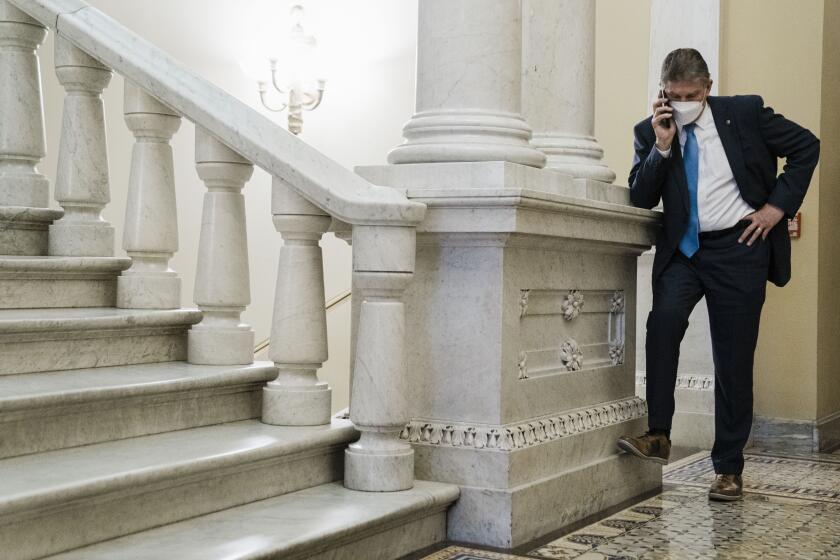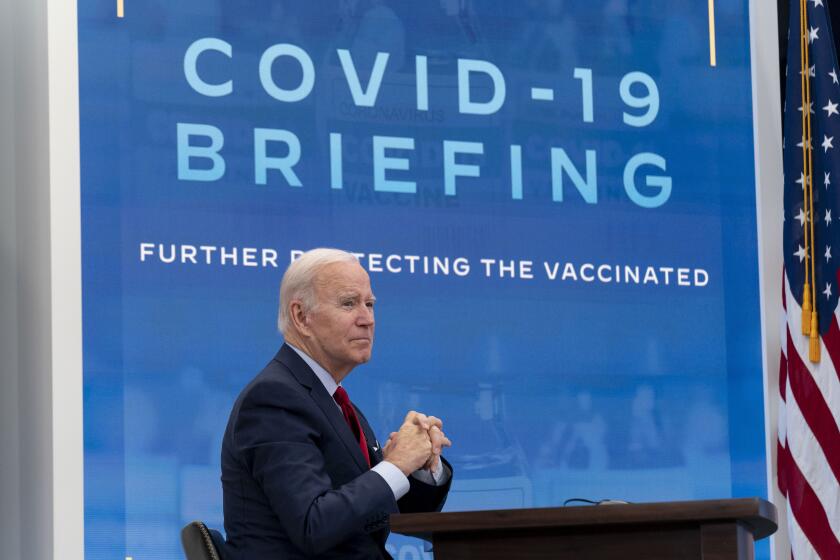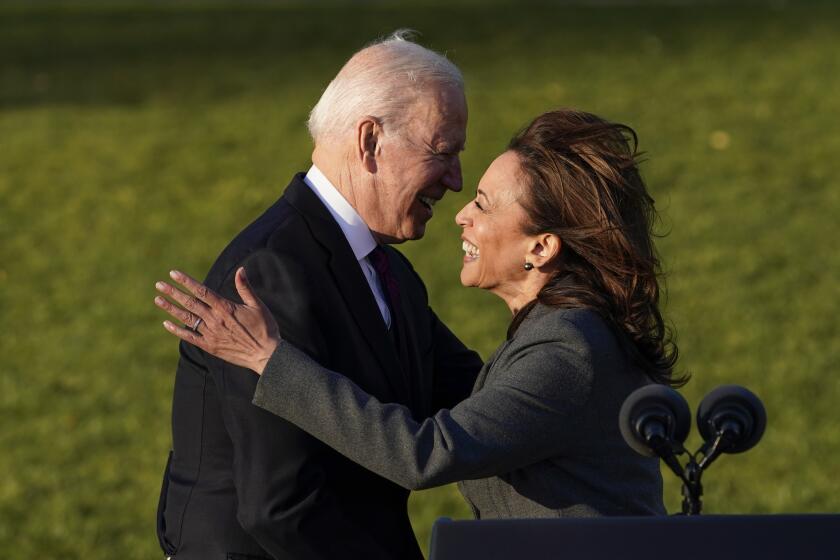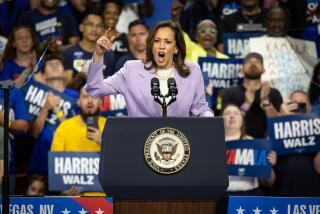Biden’s push for voting rights failed. Will another promise to Black voters fall short?
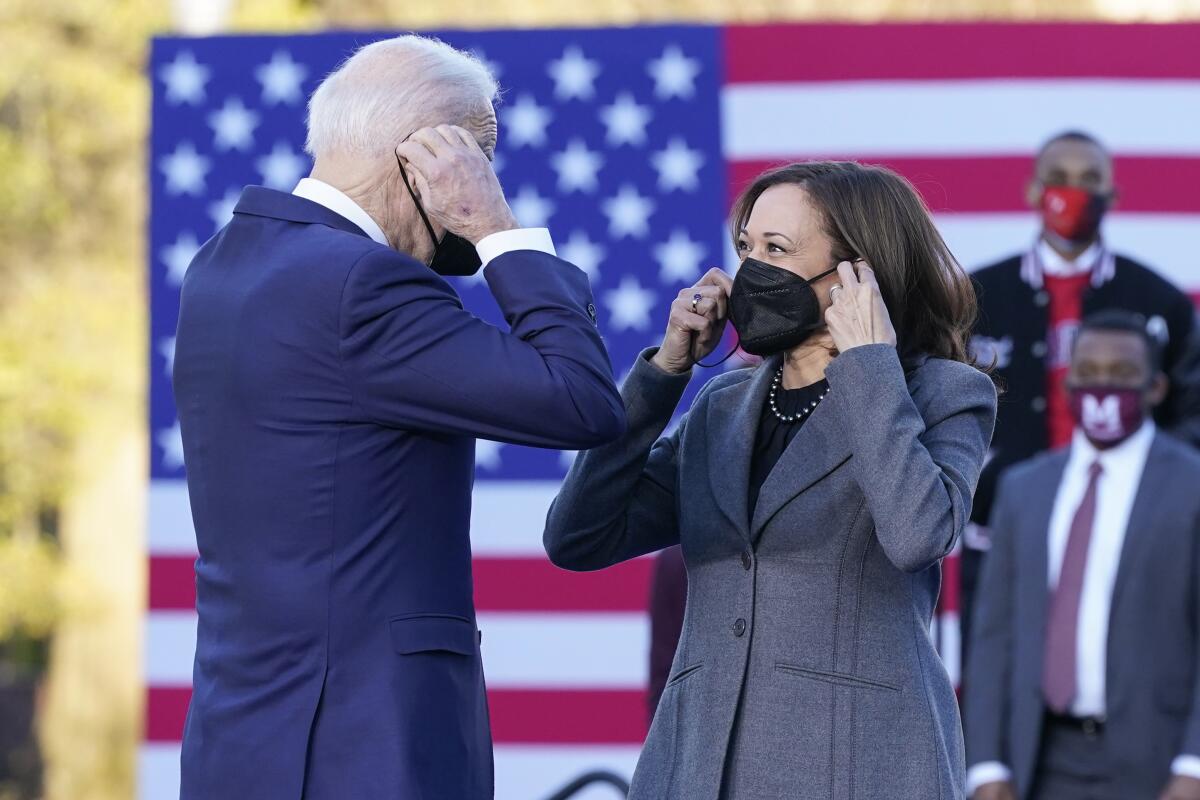
- Share via
With the push for federal voting rights legislation blocked in Congress, President Biden is facing mounting pressure from civil rights groups to enact new criminal justice policies — or risk failing to deliver another key promise to Black voters.
Activists had hoped the momentum from the nationwide outrage over George Floyd’s killing by a police officer, and the election of Vice President Kamala Harris, a woman of color with deep experience in law enforcement, would set the stage for long-desired changes, including easier prosecution of police misconduct and limiting their immunity from civil lawsuits.
But with legislative efforts languishing in Congress and little public engagement by the White House, Democrats are in danger of disappointing a crucial voting bloc in the run-up to the midterm election.
“If we don’t see movement, we’re facing an uphill battle in turnout, in motivation,” said Aimee Allison, who heads She the People, a national network that focuses on turning out women of color in swing states to vote.
But as the calls for a win on criminal justice ramp up, so does the political challenge for Democrats. Violent crime has surged in cities across the country. Although the overall picture is mixed, with some property crimes declining, recent incidents such as shootings of on-duty police officers, smash-and-grab robberies and assaults on Asian Americans have propelled public safety to a top concern of voters. Even mayors of progressive meccas such as San Francisco are proposing more policing in response.
Biden knew his voting rights push was unlikely to succeed, yet felt he had to plunge ahead in the face of pressure from activists and other Democrats.
The current environment makes many politicians wary of appearing to scale back law enforcement. Though most Democrats have not sought to cut police budgets, Republicans have eagerly linked them to the “defund the police” movement supported by some activists, in a bid to portray the party’s efforts to overhaul law enforcement practices as a risk to public safety.
“Unfortunately, the Democrats have become associated with the sort of soft on crime approach … which I think has really hurt them,” said Ruy Teixeira, a senior fellow at the left-leaning Center for American Progress who studies demographic and polling trends.
The party now finds itself squeezed by both sides in the debate. GOP candidates are already on the airwaves hammering Democrats for fostering lawlessness, while prominent Black activists and media personalities are pressing Biden and Harris to follow through on campaign pledges.
“I hear the frustration, but let’s not deny the impact that we’ve had and agree also that there is a whole lot more work to be done and it is not easy to do,” Harris said in an interview last month with radio personality Lenard “Charlamagne tha God” McKelvey.
The voting rights loss may have motivated Biden to show some progress on criminal justice. A source familiar with the White House’s deliberations, requesting anonymity to discuss internal strategy, said the administration is considering an executive order that the president may sign imminently. Such orders, by their nature, are far less powerful than laws passed by Congress, but they can use federal funding to spur departments to improve training, recruitment and tracking of incidents.
“We need to deliver something in regards to police reform, so I am hopeful that the White House will act,” said Rep. Karen Bass, a Los Angeles Democrat running for mayor who, along with Sen. Cory Booker, a New Jersey Democrat, pressed for executive action after the attempt to negotiate a bill with Republicans failed last year.
Larry Cosme, president of the Federal Law Enforcement Officers Assn., credited the administration’s “robust engagement with law enforcement” on the issue, but declined to comment on the specifics of the negotiations.
History is not on Democrats’ side in the upcoming midterm elections. The party is also hampered by issues over which it has little control.
Civil rights groups also predict a renewed effort, either through executive actions or narrowly focused legislation.
“I wouldn’t be surprised if we see a greater energy around this topic as we get closer and closer to the midterms,” said Jamie R. Riley, director of race and justice at the NAACP.
So far, however, the administration’s lack of major accomplishments has opened it to criticism that it hasn’t made reform enough of a priority.
“It’s been on the back burner. I don’t think there’s been a meaningful conversation about it,” said Yvette Simpson, chief executive of Democracy for America, a progressive advocacy group. She noted that even former President Trump had signed legislation to shorten federal prison sentences.
“What Biden has to do is be better than that,” she said. “He cannot walk away and do worse than Trump on criminal justice reform.”
For many Black voters, legislation to overhaul police practices is just as important as federal voting protections, said Aimy Steele, leader of the New North Carolina Project, which works to increase outreach and organization among voters of color.
“Why? Because the criminal justice act directly affects how Black and brown people interact with police,” Steele said.
In contrast to his highly visible championing of voting rights — which included a fiery speech delivered in Georgia — the president has not made a comparable effort to advance a criminal justice overhaul.
White House officials point to executive actions on this front, including ending contracts with private detention facilities and directing the U.S. Justice Department to enact restrictions on chokeholds and no-knock warrants for federal law enforcement.
A bill with a more sweeping overhaul of police practices — including banning chokeholds and no-knock warrants at the local level, and addressing “qualified immunity,” which shields law enforcement from most civil lawsuits — passed the Democrat-led House in the spring on a party-line vote.
But the measure, named the George Floyd Policing Act, died in the Senate last year after negotiations between Booker and Sen. Tim Scott, a South Carolina Republican, broke down. People involved in the talks, including Bass, see little chance of a revival heading into this year’s midterms, given the lack of incentive for Republicans to cooperate.
Biden publicly urged Congress to pass the legislation several times, including in his reaction when Derek Chauvin was convicted of Floyd’s murder in April. A White House official said Harris was involved behind the scenes — speaking with Booker as he negotiated with Scott — but agreed with others involved in the discussions that she and Biden deliberately kept their public comments muted to give senators room to seek a deal.
Criminal justice is not part of Harris’ public portfolio, a conspicuous absence given her experience as a prosecutor and California’s attorney general. Some of her allies see this as a missed opportunity, both to advance the cause and to improve her political standing after a wobbly first year as vice president.
Harris has struggled throughout her career to navigate the thorny politics of criminal justice. She worked hard to win over skeptical police groups in California for her statewide campaigns, but she was also hammered by progressives for not doing enough to address over-incarceration and police violence. Her presidential campaign was never clear whether it considered her prosecutorial past a selling point or a liability.
The Democratic Party as a whole finds itself walking a similar tightrope on the issue.
Kamala Harris’ former status as a prohibitive favorite as the party choice to succeed President Biden has taken a hit amid criticism of her as vice president. But denying her the job could create problems for Democrats with two key constituencies — Black and female voters.
Some Democratic political operatives argue that the broader swath of voters needed in the midterm election — including many Black voters — care most about the COVID-19 pandemic and its effects on healthcare, schools and the economy.
“That’s what’s affecting their lives now. Can my kids go to school? Can I go to work?” said Joel Benenson, who served as a pollster and strategist for Barack Obama and Hillary Clinton.
Meanwhile, Democrats are facing a more complicated political task: continue to demonstrate support for some accountability measures — which remain popular, according to polls — without appearing oblivious to the nationwide increase in violent crime.
The party’s underperformance in 2020 House races set off a fierce intraparty debate over whether Republican attacks linking them to “defund the police” were a political albatross.
Some prominent Democrats have pointedly stepped up their emphasis on public safety. New York Mayor Eric Adams, a former police officer known at the time for criticizing his department’s practices, centered his mayoral campaign on public safety. San Francisco Mayor London Breed has called for increased policing in the city’s troubled Tenderloin neighborhood and clashed with the city’s progressive district attorney.
Simpson, of Democracy for America, acknowledged that politicians are under pressure to look tough on crime, but said that shouldn’t stop the work to address police misconduct.
“What we need to do is reset the conversation, separating safety from police accountability,” she said. “Everybody wants to be safe — Black, white, rich, poor. That shouldn’t cost Black and brown lives.”
More to Read
Get the L.A. Times Politics newsletter
Deeply reported insights into legislation, politics and policy from Sacramento, Washington and beyond. In your inbox three times per week.
You may occasionally receive promotional content from the Los Angeles Times.
